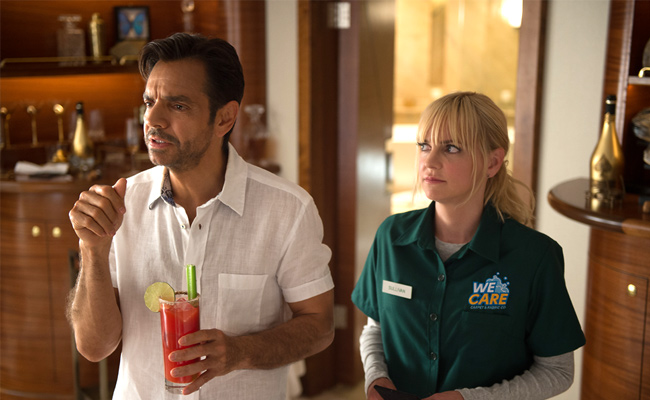
Overboard was a 1987 Garry Marshall comedy starring real-life couple Kurt Russell and Goldie Hawn, which garnered neither strong reviews (currently 46% on RottenTomatoes; Ebert liked it, Siskel didn’t) nor massive returns (at $26.7 million, it was the 45th highest-grossing movie that year, just below Police Academy 4 and two slots above Innerspace). It’s remembered mainly for… well, I’m not sure. Is it remembered?
Whatever the case, 2018 has gifted us a remake (isn’t it better to remake movies we don’t really remember than the beloved ones anyway?). In the original, Hawn played a spoiled heiress who fell off her yacht and got amnesia, whereupon the overworked widower played by Kurt Russell tricked her into thinking she was his wife to get her to take care of his four sons. In this gender-swapped, culture-clash remake, Anna Faris plays Kate, a frazzled widow studying for a nursing exam, and Eugenio Derbez, director and star of the most successful Spanish language film ever in the US (2013’s Instructions Not Included), plays rich party boy heir Leonardo Montenegro, in the feature directing debut of screenwriting vets Rob Greenberg and Bob Fisher.
You wouldn’t think an amnesia narrative would play in 2018, but Fisher and Greenberg wisely establish a telenovela motif, by way of Kate’s co-worker at the pizza place (she works as a delivery girl), who watches telenovelas while he cooks and talks about how great they are. It’s a little heavy-handed, and once established, we could do without the fourth-wall breaking callbacks (“See? This movie is just like a telenovela!”), but it does a good job establishing a tone. It’s a handy way of saying “We acknowledge that this will be big and broad and silly, but if you go with it you won’t be disappointed.”
Finding the right tone with material this family-friendly and transparently shticky is Overboard‘s most important, and arguably its most difficult, task. Greenberg and Fisher surprisingly seem up to the job. Montenegro falls off his yacht, gets amnesia, Kate tricks him into playing Mr. Mom for her three daughters (with the help of her pizza boss, played by Eva Longoria), and we accept it. Because, while it’s not exactly laugh-out-loud funny, it is cute enough to be charming and not quite saccharine enough to be nauseating. Anna Faris can do “cute.”
Updating it to a cross-cultural comedy in addition to an opposites-attract rom-com also gives the remake a little more meat. As a white woman slumming it in the world of blue collar work while she studies towards her nursing degree, virtually all of Kate’s friends and coworkers are Latin. It’s striking that a film that’s such a transparently campy melodrama is more honest about what blue collar work actually looks like and who does it than more “grounded” fare. So it is that Kate tricks Leonardo into thinking he works construction with Eva Longoria’s husband Bobby (Mel Rodriguez), a jolly contractor with a big panzón who’s always busting balls with his job site soldiers, Burro, Burrito, Don Vito, and Jason.
Rodriguez’s affable performance is probably the highlight of the film, and the chemistry between the working boys is real. They take to calling Leonardo “Lady Hands,” and their good natured acceptance of their back-breaking work (a sort of shrugging “what’re ya gonna do?”) was so accurate to people I worked alongside in my younger years that it gave me flashbacks (specifically, to a forklift driver named Henry, who conversed with me mostly in whistles and hand gestures, always drank a quart of High Life on his lunch break, and called me “Vic” for an entire Summer). The most poignant scene is one in which the rich-but-can’t-quite-remember-it Leonardo describes his new life of seemingly endless toil, with an aging face he barely recognizes anymore, a wife he never has sex with, and an almost total lack of anything meaningful in his life. “This can’t really be all there is, can it?”
And his coworkers all nod knowingly as if to say, “Yeah, man! That’s exactly all there is, you want another beer?”
It’s notable that the scene takes place entirely in Spanish. What was I saying about a missing ingredient? Oh yeah. The odd thing about Eugenio Derbez, who looks a bit like a more mouse-like Jerry Lewis, is that all his natural charm and acting ability seems to evaporate the moment he switches to English. It’s strange, because he speaks the language fine, in fact he barely has an accent, but for some reason instantly goes from believable everyman in Spanish to sounding like he’s reading the plot to us like a dad performing a children’s book to his five-year-old in English. He simultaneously over-enunciates and under-emotes, and in places where it seems like the material calls for hammy mugging, like when he spills an entire pot of pasta sauce on himself, Three Stooges-style, he just stares blankly, stuck halfway between inscrutable and underacted.
This is no small problem. Essentially the entire movie rests on Leonardo’s journey, from spoiled heir to devoted family man. His arc is the movie. Whatever else you could say about the original (and what can you say? I honestly don’t remember) it had the natural chemistry of a real-life couple falling in love. The remake has the right tone, an interesting angle, a delightful supporting cast, and Anna Faris acts her butt off, but there are times it feels like she’s doing it opposite an upturned broom.
It’s a shame. Overboard does a lot of things right, is cleverly conceived, and in most ways is better than it has any right to be. But it’s like a dish where everything works except the main ingredient.






